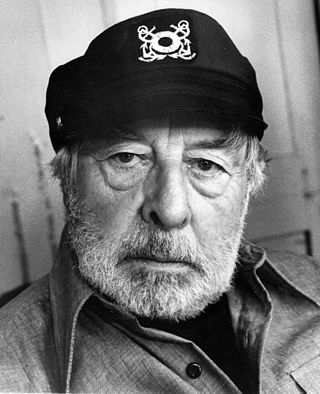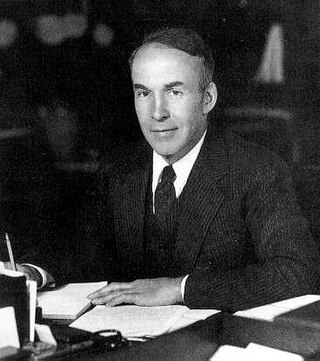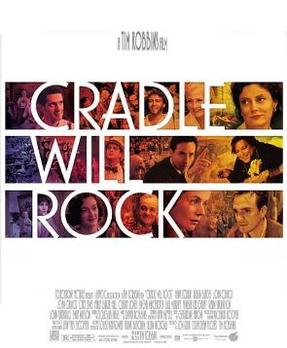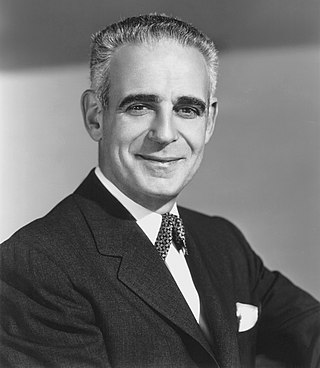
George Orson Welles was an American actor, director, screenwriter, and producer who is remembered for his innovative work in film, radio, and theatre. He is considered to be among the greatest and most influential filmmakers of all time.

"The War of the Worlds" was a Halloween episode of the radio series The Mercury Theatre on the Air directed and narrated by Orson Welles as an adaptation of H. G. Wells's novel The War of the Worlds (1898) that was performed and broadcast live at 8 pm ET on October 30, 1938 over the CBS Radio Network. The episode is famous for inciting a panic by convincing some members of the listening audience that a Martian invasion was taking place, though the scale of panic is disputed, as the program had relatively few listeners.

John Houseman was a Romanian-born British-American actor and producer of theatre, film, and television. He became known for his highly publicized collaboration with director Orson Welles from their days in the Federal Theatre Project through to the production of Citizen Kane and his collaboration, as producer of The Blue Dahlia, with writer Raymond Chandler on the screenplay. He won the Academy Award for Best Supporting Actor for his portrayal of Professor Charles W. Kingsfield in the 1973 film The Paper Chase. He reprised the role of Kingsfield in the 1978 television series adaptation.

Archibald MacLeish was an American poet and writer, who was associated with the modernist school of poetry. MacLeish studied English at Yale University and law at Harvard University. He enlisted in and saw action during the First World War and lived in Paris in the 1920s. On returning to the United States, he contributed to Henry Luce's magazine Fortune from 1929 to 1938. For five years, MacLeish was the ninth Librarian of Congress, a post he accepted at the urging of President Franklin D. Roosevelt. From 1949 to 1962, he was Boylston Professor of Rhetoric and Oratory at Harvard. He was awarded three Pulitzer Prizes for his work.

Cradle Will Rock is a 1999 American historical drama film written, produced and directed by Tim Robbins. The story fictionalizes the true events that surrounded the development of the 1937 musical The Cradle Will Rock by Marc Blitzstein; it adapts history to create an account of the original production, bringing in other stories of the time to produce a social commentary on the role of art and power in the 1930s, particularly amidst the struggles of the labor movement at the time and the corresponding appeal of socialism and communism among many intellectuals, artists and working-class people in the same period.

The Mercury Theatre was an independent repertory theatre company founded in New York City in 1937 by Orson Welles and producer John Houseman. The company produced theatrical presentations, radio programs and motion pictures. The Mercury also released promptbooks and phonographic recordings of four Shakespeare works for use in schools.

The Cradle Will Rock is a 1937 play in music by Marc Blitzstein. Originally a part of the Federal Theatre Project, it was directed by Orson Welles and produced by John Houseman. Set in Steeltown, U.S.A., the Brechtian allegory of corruption and corporate greed includes a panoply of social figures. It follows the efforts of Larry Foreman to unionize the town's workers and combat the powerful industrialist Mr. Mister, who controls the town's factory, press, church, and social organization. The piece is almost entirely sung-through, giving it many operatic qualities, although Blitzstein included popular song styles of the time.
J.B. is a 1958 play written in free verse by American playwright and poet Archibald MacLeish, and is a modern-day retelling of the story of the biblical figure Job. The play is about J.B., a devout millionaire with a happy domestic life whose life is ruined. The play went through several incarnations before it was finally published. MacLeish began the work in 1953 as a one-act production, but within three years, had expanded it to a full, three-act manuscript.

Paul Stewart was an American character actor, director and producer who worked in theatre, radio, films and television. He frequently portrayed cynical and sinister characters throughout his career.

Rose McClendon was a leading African-American Broadway actress of the 1920s. A founder of the Negro People's Theatre, she guided the creation of the Federal Theatre Project's African American theatre units nationwide and briefly co-directed the New York Negro Theater Unit.

The Spanish Earth is a 1937 anti-fascist film made during the Spanish Civil War in support of the democratically elected Republicans, whose forces included a wide range from the political left like communists, socialists, anarchists, to moderates like centrists, and liberalist elements. The film was directed by Joris Ivens, written by John Dos Passos and Ernest Hemingway, narrated by Orson Welles and re-recorded by Hemingway, with music composed by Marc Blitzstein and arranged by Virgil Thomson.

Robert Wesley Addy was an American actor of stage, television, and film.

The Voodoo Macbeth is a common nickname for the Federal Theatre Project's 1936 New York production of William Shakespeare's Macbeth. Orson Welles adapted and directed the production, moved the play's setting from Scotland to a fictional Caribbean island, recruited an entirely Black cast, and earned the nickname for his production from the Haitian vodou that fulfilled the role of Scottish witchcraft. A box office sensation, the production is regarded as a landmark theatrical event for several reasons: its innovative interpretation of the play, its success in promoting African-American theatre, and its role in securing the reputation of its 20-year-old director.

The Fall of the City by Archibald MacLeish is the first American verse play written for radio. The 30-minute radio play was first broadcast April 11, 1937, at 7 p.m. ET over the Columbia Broadcasting System as part of the Columbia Workshop radio series. The cast featured Orson Welles and Burgess Meredith. Music was composed and directed by Bernard Herrmann. It is an allegory on the rise of Fascism.

The Mercury Theatre on the Air is a radio series of live radio dramas created and hosted by Orson Welles. The weekly hour-long show presented classic literary works performed by Welles's celebrated Mercury Theatre repertory company, with music composed or arranged by Bernard Herrmann. The series began July 11, 1938, as a sustaining program on the CBS Radio network, airing Mondays at 9 pm ET. On September 11, the show moved to Sundays at 8 pm.

Native Son is a 1941 Broadway drama written by Paul Green and Richard Wright based on Wright's novel Native Son. It was produced by Orson Welles and John Houseman with Bern Bernard as associate producer and directed by Welles with scenic design by John Morcom. It ran for 114 performances from March 24, 1941 to June 28, 1941 at the St. James Theatre.

This is a comprehensive listing of the theatre work of Orson Welles.
There isn't one person, I suppose, in a million, who knows that I was ever in the theatre.
The Comedy Theatre was a Broadway theatre located at 110 West 41st Street in Manhattan that opened in 1909. It presented the first Broadway appearances of Katharine Cornell and Ruth Draper, as well as Eugene O'Neill's first Broadway play. Shuttered in the wake of the Depression, it reopened in 1937 as the Mercury Theatre — the venue for Orson Welles's groundbreaking adaptation of Shakespeare's Julius Caesar and other productions for the Mercury Theatre repertory company. In 1939 it began presenting classic Yiddish theatre. The building was demolished in 1942.

Caesar is the title of Orson Welles's innovative 1937 adaptation of William Shakespeare's Julius Caesar, a modern-dress bare-stage production that evoked comparison to contemporary Fascist Italy and Nazi Germany. Considered Welles's highest achievement in the theatre, it premiered November 11, 1937, as the first production of the Mercury Theatre, an independent repertory theatre company that presented an acclaimed series of productions on Broadway through 1941.

Joseph Holland was an American actor of stage and screen who was principally known for his work in the theatre. Active on Broadway from 1935 through 1957, he was particularly admired for his performances in the plays of William Shakespeare. He was notably a founding member of John Houseman and Orson Welles' Mercury Theatre in 1937; performing the title role in Shakespeare's Julius Caesar for the first play mounted by that company. During that production he was seriously wounded by Welles, in the role of Brutus, who stabbed him in the chest and arm with a steel knife in the famous Act 3 Scene 1 betrayal. After a month of recovery, he returned to the production. Holland went on to create roles in original works by playwrights Maxwell Anderson, Lindsay and Crouse, Elsie Schauffler, and Robert E. Sherwood. He worked periodically on television as a guest actor from 1949 through 1961 on a variety of programs, and appeared in a minor supporting role in the 1958 film Rally Round the Flag, Boys!.



















